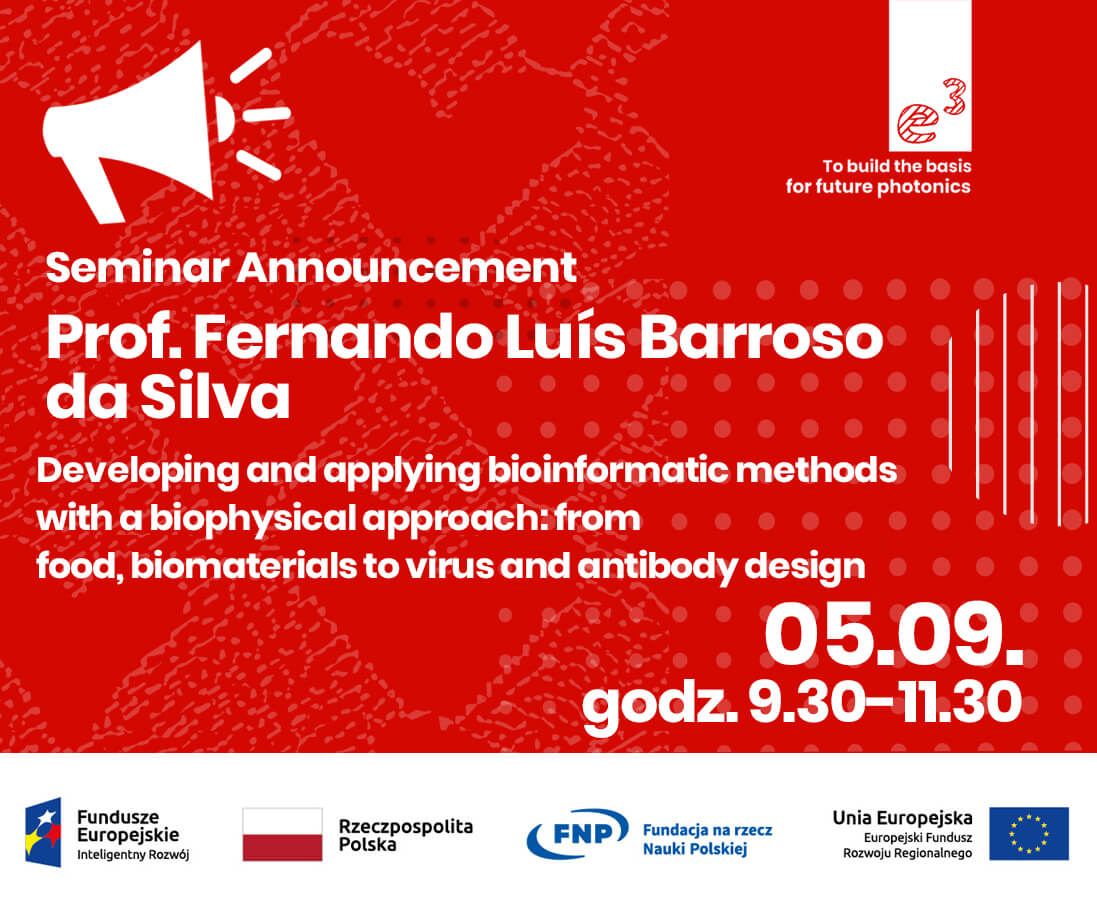I agree my information will be processed in accordance with the ENSEMBLE³ Privacy Policy.
Sign up for our newsletter
I Privacy policy |
Functional Materials Technology Group
Optical Nanocharacterization Group
Inverse Materials Design Group
Next-Generation Energy Systems Group
Biophotonic Applications Group
Solar Energy Conversion Group
Oxide Single Crystals Group
A3B5 Compound Semiconductors Group
Functional Materials Laboratory
Oxide Single Crystals Laboratory
Materials Characterization Laboratory
III-V Compound Semiconductors Laboratory
Contact
Ensemble3 sp. z o.o.
01-919 Warsaw
133 Wólczyńska St.
NIP 1182211096
KRS 0000858669
Prof. Fernando Luís Barroso da Silva - seminar announcement
📢 Continuing our series of seminars, we are happy to welcome Prof. Fernando Luís Barroso da Silva, this coming Tuesday. 🌍
🗓️ Date: 05-09-2023
🕙 Time: 9:30 - 11:30 AM
🏢 Venue: Ensemble3 Open Space, Building 8, Łukasiewicz - Institute of Microelectronics and Photonics
🎤 Dive deep into bioinformatics and its multifaceted applications ranging from food to virus and antibody design. Stay on for an discussion on the lecture by Dr. Piotr Paszke and Dr. Piotr Piotrowski, focusing on exosomes. 🧪
Part 1:
"Developing and applying bioinformatic methods with a biophysical approach: from food, biomaterials to virus and antibody design"
Abstract:
A vast class of biomolecular engineering problems at present including the understanding, diagnosis, and treatment of diseases; developments in the pharmaceutical and food industries; design of new (bio)functionalized materials and processes of bioseparation, in general, relies on a better knowledge of the fundamental physical interactions responsible for the formation and stability of molecular complexes. pH is a key physical-chemical parameter for many of them that is also related to the macromolecular complexation even "on the wrong side of the pI". At our lab, our focus has been on the development of coarse-grained descriptions that could result in a good compromise between the proper modeling of the constant-pH physics and the simulation time. In this talk, I will review the main aspects of the peculiar attraction behind like-charge macromolecules, the constant-pH simulation models devised for different biomolecular applications, and how we have been using these tools together with other structural bioinformatic methods to better understand spidroins, viruses and designing therapeutic agents. This presentation might offer an overview of the possibilities we can explore for future collaboration on modeling complex systems relevant to the Ensemble3 (e.g. exosomes).
Part 2 (more focus on virus and antibody):
Unlocking the molecular aspects of Zika and SARS-CoV-2: An exploration through computer simulations
Computational approaches applied to the study of infectious diseases are creating a new research field using a multidisciplinary approach, taking advantage of the great progress in molecular and structural biology, immunology, bioinformatics, and related areas to foster the understanding of infectious diseases and driving innovation in their treatment, diagnosis, and prevention. Employing a diverse set of computational resources that incorporates our in-house developed tools alongside external options, we have been studying the molecular aspects of Zika (ZIKV) and SARS-CoV-2 viruses. For ZIKV, the characterization of different biological interfaces related to the nonstructural protein 1 (NS1) allows hypothesizing possible molecular mechanisms to explain the different pathological characteristics of the Brazilian and the Uganda strains. For SARS-CoV-2, a set of different studied systems contributes to understanding the key differences between the variants and their interactions with cell receptors and monoclonal antibodies. Our new computational design approach led to the development of new macromolecular binders with improved binding affinities. We could present a simple predictor for the receptor-binding domain and angiotensin-convert enzyme-2 (RBD-ACE2) binding affinity based on the data obtained for Alpha, Beta, Gamma, Delta, and Omicron variants, which have also been validated and could well predict the behavior of newer variants not available during the initial study. This rule can work as a quick test of the degree of transmission of the coming SARS-CoV-2 variants in the future.
Prof. Fernando Luís Barroso da Silva, is an Associate Professor at the School of Pharmaceutical Sciences at Ribeirão Preto, University of São Paulo. Specializing in Molecular Biophysics and Theoretical Chemistry, his career includes prominent guest professorships across Europe and robust research collaborations focusing on molecular modeling and viral protein studies. His works delve into electrostatic interactions in biological systems and functionalized binders for flaviviruses.


